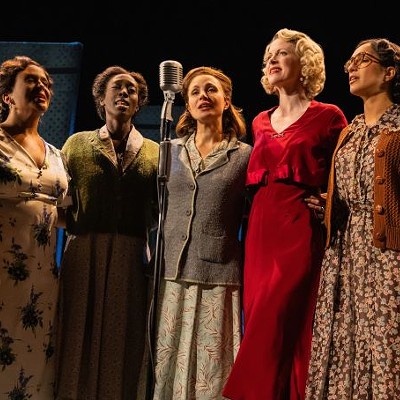About to lead the Italian premiere of Richard Wagner's Siegfried at Milan's La Scala Opera, legendary conductor Arturo Toscanini was stopped backstage by a very nervous tenor who was singing the title role. “Maestro, how do you think it will go?” Never one to miss a beat, the fiery conductor looked him up and down. “Who knows? Too many beasts. There's that bear, that dragon, that bird, those dwarfs...then there's you!”
The marvelous third opera in Wagner's titanic The Ring of the Nibelung, referred to as the mighty cycle's “scherzo” movement, is all about young Siegfried, and it's a killer role. A production can withstand a less than stellar Mime, Alberich, Fafner, Erda, even Wotan or Brünnhilde, but without a riveting heldentenor in the part, there's no opera. He's the reason for the show, its drive, impulse, heart. There's no other role in all of opera as demanding as this “stupid boy” who doesn't know fear.
Houston Grand Opera has nothing to fear, either. Not only does it give us a dream cast for all the sundry characters – human, god, beast – with which this opera's packed, but it gives us a dream Siegfried in Jay Hunter Morris. He may have lost a bit of his stentorian oomph from seasons past and at times disappears under Wagner's swirling orchestral maelstrom instead of riding over it, but he remains the most competent surfer in the international opera world. He's the best Siegfried there is today, and that's saying everything, because Siegfrieds don't come around every generation. Sometimes they skip decades. Riveting, Morris is prime.
I said this was a killer role, and most heldentenors dread the challenge. Not only do you have to pretend you're some young dumb hunk – the übermensch, Nietzsche's Superman, Germany's Golden Boy – but you also have to sing full out for almost four solid hours. You've got to be lyric, heroic, a little boy lost, an intrepid warrior, a lover of nature, an impetuous fool and, during the half-hour finale, the most ardent of lovers. Let's just say this role isn't easy for anyone to pull off, even someone versed in Wagner's particular, idiosyncratic vocal style. A complete stage artist, Morris pulls off this prestigious feat with the dexterity of Gypsy Rose Lee.
If you ever wondered what J.J. Watt might look like as an opera singer, come see and hear the robust Morris. He's alive onstage, a solid guy quick on his feet. He can sit on the floor with legs splayed like a kid playing jacks, then spring into action on a dime. If there were tires onstage for football drill practice, Morris could probably bound through them like a gazelle. Although saddled with the most god-awful costume – greasy blond dreadlocks, some torn and ragged leather straps for a tunic, with a comic wolf's tail hanging from his ass – he's a picture-book avatar of youthful strength and boy's adventure comic. Best of all, he never tires or loses steam. He gathers more strength as the long night progresses. At the end, with former warrior goddess Brünnhilde within reach (a radiant and rock-solid Christine Goerke, pretty picture-book herself), his eyes did truly gleam. He has found his match, an equal partner in a fiery love that will bring down the gods. Embracing, they laugh at the coming conflagration. During his curtain call, the audience rose as one to burst into clamorous ovation. He deserved it.
In case you need a primer, although the opera backtracks the story for us, as happens in every one of the Ring series, Siegfried is a bastard orphan. His dad, a son of randy king of the gods Wotan (a sonorous and superb Iain Patterson), died in combat during previous Walküre, but not before he got his sister Sieglinde pregnant. She dies in childbirth. Found by evil Nibelung dwarf Mime (an oily and creepy Rodell Rosel), the child is raised in the hope that he will eventually kill dragon Fafner (great bass Andrea Silvestrelli), the giant who built Valhalla for the gods, who guards the golden treasure, which includes that all-powerful ring everybody in the cycle desperately desires. Brought up in the forest, the fearless boy, a true son of nature, hates his stepfather and intuitively knows this ugly little thing is not his father.
When Mime reveals his father's broken sword, Siegfried forges the pieces anew (the stunning, athletic “Forging Scene,” which closes Act I on a high), slays the dragon, reaps the treasure, kills Mime and, heeding the Forest Bird (a precise and twittery Mane Galoyan), rushes to the mountaintop where Brünnhilde lies in her deathless sleep, to be awakened by a hero who “knows no fear.”
Barring the way is Granddad himself, whom Siegfried doesn't know. The old god tries in vain to stop the boy, but he knows it's fruitless. Siegfried shatters Wotan's staff (make of that what you will), and the impotent god shambles off stage. Stepping through the flames, he discovers what he thinks is a fallen warrior. He unlashes the breastplate and recoils. “That is no man,” he cries in one of opera's never-fail laugh lines. The impetuous youth experiences fear for the first time. Not knowing what to do, he kisses her.
Brünnhilde awakes to some of Wagner's most incandescent music, scored with ethereal strings and harp arpeggios. She hails the sun, the light and this curiously timid savior. It is poetry in music. The virgin goddess begs not to be sullied, but she's lost her godhead under the spell, so that argument doesn't fly anymore. Anyway, she's destined for the big lug and had prophesied he would be the one to walk through fire to get her. Destruction will surely come later, but now it's time to party. In a stirring blast of high C, the two matchless lovers laugh at the thrill of passion. Wagner brings down the curtain in a rhapsodic rush.
Other major players in the tale include Mime's brother, the evil dwarf Alberich (scene-stealing baritone Richard Paul Fink), who started the cycle in Rhinegold and ordained the gods' end by stealing the gold of the Rhine maidens. Fink sings magnificently, much as he recently did as the Water Sprite in HGO's last production, Dvorak's Rusalka. Then there's all-wise, all-knowing earth mother Erda, summoned from her subterranean sleep by Wotan, portrayed with Wortham-shaking deep-dish contralto by Meredith Arwady. Now we know where Brünnhilde, a.k.a. Ms. Goerke, gets those rumbling lows and rich, creamy highs. She's Erda's daughter – by you know who? Wotan, of course. He's not called The Wanderer for nothing. The familial vocal relationship is uncanny.
To be charitable, the physical production is a horror. Overseen by the former Spanish avant-garde street theater group La Fura Dels Baus, directed by Carlus Padrissa, this is video game as IMAX opera. Giant projection screens are pushed about, on which are all manner of eye-popping CGI action. Mime's forest cave is now some mammoth industrial factory, something out of late-'20s constructivist Russian propaganda movies. I expected to see Eisenstein's cream separator from Old and New hiding somewhere among the pistons, gears and Soviet machinery. The background's so busy and distracting, we strain to hear the music it's ineffectually depicting with so much sturm und drang. When Wotan journeys to summon Erda, we're subjected to a Sound of Music panoramic travelogue of arctic mountain ranges that we zoom and twist through, over and around, all while Wagner's magnificent chromatic music tries to catch up. Disney cartoon flowers swirl through the evocative “Forest Murmurs,” lessening his radiant tone painting of nature in bloom. As a youth, Siegfried is supposed to be all alone in the world, except for Mime, never having seen another person. Now he's surrounded by comic lab technicians who scamper and bobble everywhere, sweeping up, unplugging electric cords, lighting the forge. Everywhere, the overall scenic effect is all wrong. It's also so disrespectful.
The 3-D pictorial design is awesome in its way, high tech to the nines, but it's way too simple and one-dimensional. If someone sings about that bloody ring, you know it's going to show up on the scrim. If someone says birds, there they are, animated and swooping in murmuration behind the singer. All-seeing Erda is just that – a giant eyeball in film negative.
When the visual equivalents are less specific, they work best. The rising passion between the lovers is shown against what looks like a lava lamp on steroids, but the bubbling and colliding globs at least hint at sexual subtext without being so damned literal. Fafner's dragon is a clever origami creation that the Menil would be proud to display, fueled by pistons and geegaws. It's hardly terrifying, so the fight to the death consists of Siegfried walking around this pneumatic parade float as the orchestra pumps up the volume. Unfortunately, HGO's stuck with this dismal Eurotrash production, and we've got to live with it, too. One left to go, Götterdämmerung next spring.
Fortunately, maestro Patrick Summers goes about his business – I hope with his eyes closed – and delivers a mighty interpretation, regardless of the hideousness of the visual concept. The HGO orchestra has never sounded so lush, so much in love with the score. We may not like what we see, but what we hear is sublime and glorious. Wagner breathes deep and true, and that is a rare show by itself. Morris, Goerke et al. lead the way with banners unfurled. Siegfried triumphant!
Performances of Siegfried continue on April 20, 23, 28; May 1m at Houston Grand Opera, Worthan Center, 500 Texas at Prairie. For more information, call 713-228-6737 or visit houstongrandopera.org. $28-$245.
Support Us
Houston's independent source of
local news and culture
account
- Welcome,
Insider - Login
- My Account
- My Newsletters
- Contribute
- Contact Us
- Sign out
The Cast of Siegfried Triumphs in HGO's Production of the Wagner Classic
D. L. Groover April 18, 2016 7:00AM
[
{
"name": "Related Stories / Support Us Combo",
"component": "11591218",
"insertPoint": "4",
"requiredCountToDisplay": "4"
},{
"name": "Air - Billboard - Inline Content",
"component": "11591214",
"insertPoint": "2/3",
"requiredCountToDisplay": "7"
},{
"name": "R1 - Beta - Mobile Only",
"component": "12287027",
"insertPoint": "8",
"requiredCountToDisplay": "8"
},{
"name": "Air - MediumRectangle - Inline Content - Mobile Display Size 2",
"component": "11591215",
"insertPoint": "12",
"requiredCountToDisplay": "12"
},{
"name": "Air - MediumRectangle - Inline Content - Mobile Display Size 2",
"component": "11591215",
"insertPoint": "4th",
"startingPoint": "16",
"requiredCountToDisplay": "12"
}
,{
"name": "RevContent - In Article",
"component": "12527128",
"insertPoint": "3/5",
"requiredCountToDisplay": "5"
}
]
KEEP THE HOUSTON PRESS FREE...
Since we started the Houston Press, it has been defined as the free, independent voice of Houston, and we'd like to keep it that way. With local media under siege, it's more important than ever for us to rally support behind funding our local journalism. You can help by participating in our "I Support" program, allowing us to keep offering readers access to our incisive coverage of local news, food and culture with no paywalls.
D.L. Groover has contributed to countless reputable publications including the Houston Press since 2003. His theater criticism has earned him a national award from the Association of Alternative Newsmedia (AAN) as well as three statewide Lone Star Press Awards for the same. He's co-author of the irreverent appreciation, Skeletons from the Opera Closet (St. Martin's Press), now in its fourth printing.
Contact:
D. L. Groover
Trending Arts & Culture
- Reviews For The Easily Distracted:
The Fall Guy - Triple A Gaming as a Digital Only Problem
- Best Bets: Ghetto, East End Street Festival and Adam Tendler
-
Sponsored Content From: [%sponsoredBy%]
[%title%]

Don't Miss Out
SIGN UP for the latest
arts & culture
news, free stuff and more!
Become a member to support the independent voice of Houston
and help keep the future of the Houston Press FREE
Use of this website constitutes acceptance of our
terms of use,
our cookies policy, and our
privacy policy
The Houston Press may earn a portion of sales from products & services purchased through links on our site from our
affiliate partners.
©2024
Houston Press, LP. All rights reserved.





